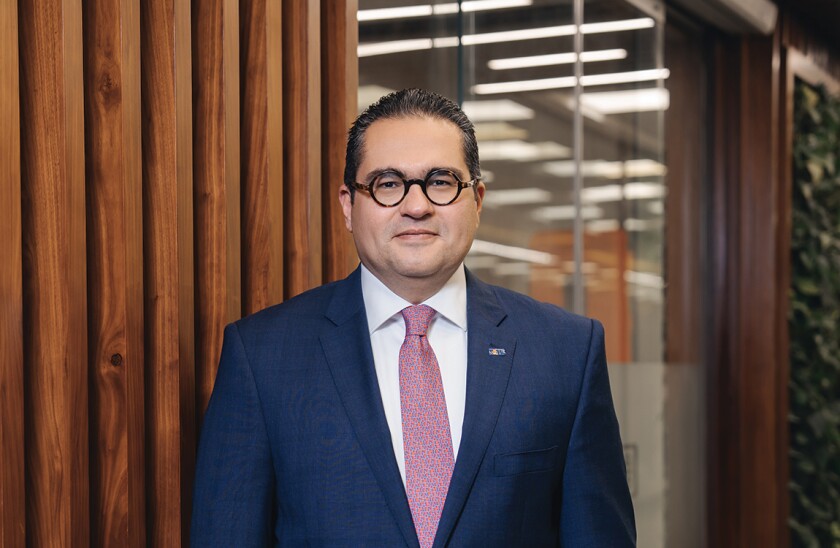What trends or developments will shape the operating environment for Egyptian banks in the coming years, and how is CIB preparing to respond?
Egypt’s banking landscape is being reshaped by accelerated digital adoption, rising financial inclusion and closer sector integration. Services are moving rapidly towards e-wallets and contactless payments, supported by national payment rails such as Instapay and the Instant Payment Network.
Financial inclusion reached 75% by end-2024, with around 52 million Egyptians aged 15 and over actively using accounts across banks, mobile wallets or prepaid cards. The Central Bank of Egypt (CBE) has also introduced Meeza and Apple Pay, licensed fully digital banks and adopted e-KYC, broadening access and speeding innovation.
CIB has undertaken a bank-wide digital transformation. We upgraded internet and mobile banking with a modern interface and a wider set of services including instant account opening, bill payments, certificate and investment product requests, and guardian account management for minors.
Under our Bank of the Future programme, in-branch services for Business Banking clients are now delivered through CIB Business Online, streamlining transactions and reducing reliance on frontline processing.
In 2024, CIB became the first private sector bank in Egypt to launch Apple Pay, bringing secure, convenient mobile payments to customers. We also use behavioural analytics and data-driven insights to tailor products to evolving needs.
What have been some of CIB’s key financial and strategic achievements over the past year?
We reported $1bn in net profit in 2024 and a total net interest margin of 9.5%. That performance reflects disciplined execution on digital transformation and customer-centric services.
We launched Apple Pay and a fully redesigned mobile app. We deployed artificial intelligence-driven tools, including virtual assistants, to enhance engagement and streamline services. We expanded access for small and medium-sized enterprises and surpassed CBE’s 25% inclusion mandate.
On sustainability, we advanced a decarbonisation initiative with the International Finance Corp and deepened our environmental, social and governance priorities, reinforcing CIB’s leadership in inclusive and resilient banking.
How is CIB expanding its regional presence, and what role do you see in supporting cross-border trade and financial connectivity across Africa?
We are executing a long-term Africa strategy anchored in Kenya as a regional hub, with three pillars: regional presence, cross-border trade facilitation and financial connectivity infrastructure.
Leveraging the Egypt-Kenya corridor, we are extending reach into neighbouring markets and replicating capabilities across economies.
CIB enables cross-border commerce through tailored trade finance, cash management and structured lending, helping Egyptian exporters and African clients navigate multi-jurisdictional flows.
Priority sectors include textiles, consumer durables and construction, where tailored solutions support regional expansion, combining transactional products with advisory support.
To deepen connectivity, we are enhancing cross-border payments, onboarding and trade-related liquidity services for SMEs, corporates and high net worth individuals.
Our approach aligns with regional initiatives across the East African Community and the Intergovernmental Authority on Development, and with continent-wide interoperability efforts.
We have joined the African Continental Free Trade Area to facilitate cross-border transactions and are exploring partnerships with the Pan-African Payment and Settlement System to reduce settlement frictions.
Through our Africa Business Desk and advisory platforms, we also provide ESG-aligned financing, knowledge transfer on corporate governance and risk frameworks that support consistent service standards across affiliates.
How is CIB expanding its approach to sustainability and ESG, and what initiatives or milestones have been achieved so far?
Our Sustainable Finance System & Strategy has embedded sustainability across the bank. In 2021 we partnered with the IFC to issue Egypt’s first corporate green bond of $100m, financing renewable energy, industrial energy efficiency, green buildings and resource efficiency.
Since then we have mobilised over $333m in blended finance and secured $9.12m in grants from the International Financial Corporation, European Bank for Reconstruction and Development and Proparco.
In December 2024 we concluded a three year agreement with the IFC to support client transitions in hard-to-abate sectors including oil and gas, power, real estate, steel, aluminium and cement — developing sector pathways and customised transition plans.
We recognised climate risk early and have published Taskforce on Climate-related Financial Disclosure reports annually since 2022. The third report emphasises transition planning in high-emission sectors, marking a shift from internal readiness to outward client engagement. We also act as a convener and catalyst by building alliances, contributing to transition standards and hosting regional dialogues to enable orderly and just transitions.
Finally, what role is innovation playing in CIB’s transformation, and which technologies or services are reshaping how you serve clients?
Innovation underpins our shift to an efficient, agile, and customer-centric model. We upgraded digital channels using in-house capabilities to optimize features and improve experience. CIB has introduced modern payment solutions, such as tokenized cards, to enhance accessibility and security.
Our Retail Transformation Team conceptualizes, develops, and implements initiatives. We transformed our channel architecture with cross-platform technology for a native-like mobile experience and adopted microservices to improve scalability and resilience — supporting a consistent omnichannel experience.
